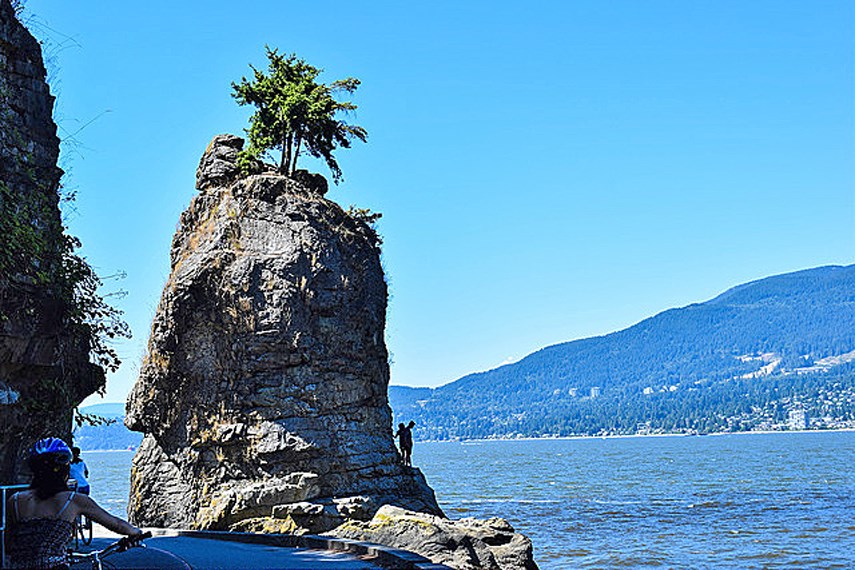So the Vancouver Parks Board is going to rename Siwash Rock, the outcropping off of Stanley Park, because some people find the name offensive?
Great!
Now I know what many of you are going to say. “How can they rename Siwash Rock?! It’s a slap in the face to Arthur J. Siwash – the Vancouverite who invented the solar-powered submarine – to even think about renaming that rock. All this because someone recently unearthed a book Arthur Siwash wrote in 1840? Don’t people know that it was perfectly acceptable back then to hunt Belgians for sport? Booooo.”
Alright, I fooled you there – there is no Arthur J. Siwash. So why the controversy? What does the name Siwash really mean?
According to Chief Ian Campbell Sekyú Siyám – a hereditary chief, elected councillor and spokesperson of the Squamish Nation who wrote a guest column in this very newspaper – Siwash is a derogatory term, a “Chinook word originating from the French ‘sauvage,’ meaning savage.”
If that’s the case, it seems to me that it should be a no-brainer to change the name, particularly if people like Chief Campbell, and Squamish Nation language expert Khelsilem, creator of the SquamishAtlas.com, are asking for a change.
But here comes a shock, and I hope you’re sitting down for this: many people are upset about the idea of changing the name. Many of them – prepare for more shock – like to post their thoughts in online comment sections and on social media.
“Political correct gibberish,” one writes. Other online experts are quick to weigh in with a “well actually” to explain to the language scholars why they are wrong about their interpretation of the word Siwash. Others complain it’s a waste of time and money to even debate changing the name, let alone go through the process of actually changing it.
I get it. Change can be hard, especially if you’ve known a certain reality your whole life. There’s a football team in Washington, D.C. whose name literally is a dictionary defined racial slur, and the team’s owner has vowed that he will never change the name. And he’s got a lot of support too, with fans citing the tradition of the team as more important to them than any offensive connotations the name might have to some groups.
What strikes me as particularly odd about that team is that they used to play in a Robert F. Kennedy Memorial Stadium, a tribute to the beloved politician who was assassinated during a run for president. When they built a new stadium, they could have kept the old name – the new ballpark in New York is still called Yankee Stadium – but the Washington team had no problem changing the name of their home stadium. Those gridiron warriors, whose racist team name is sacred to them, now play on the hallowed grounds of … FedExField.
Robert F. Who?
It doesn’t have to be so hard. Change is fine. It’s inevitable, really – it’s life. History changes too. We have this conception that history is a static snapshot that never changes, a moment frozen in time. It’s not frozen, like ice. It’s fluid, like a river. We revisit things, find new sources of information, call into question old sources of information. As political scientist David Moscrop wrote in a Maclean’s column about the debate over the legacy of Sir John A. Macdonald: “facts are objective, history is not.”
Change can be great. The sports teams for Stanford University used to have an “Indian” mascot. In the 1970s they got rid of the mascot and all references to it in their athletic department. No doubt some alumni were, and still are, upset about the change, but Stanford seems to be doing OK – their donor-fuelled endowment, as of 2016, stood at $22.4 billion.
Another example, closer to home: The first non-First Nations settlement on Burrard Inlet was Moodyville. That name died out as another name grew: North Vancouver. The name North Vancouver stands to this day noting our proud tradition as the city (and district) north of the city named after a British captain who sailed past here once.
Anyway, there’s one more great thing about name changes. I’m guessing those who get mad about potential changes are people who really like being mad about lots of things. If they change the name of Siwash Rock, or any other outdated moniker, you have every right to stay mad. All your life! And you can still call it Siwash Rock if you want, no one will stop you! You can brag to your friends about how you’ll never use the new name that all these politically correct snowflakes dreamed up. You’d be your own rock star!
Or maybe we can leave derogatory terms in the past and come up with something we all can enjoy. Maybe. Or at the very least, we can ease the fears of all those cringing at how much this is going to cost us.
Pack up your kayak, folks. It’s time for a trip out to breathtaking … FedExRock!



